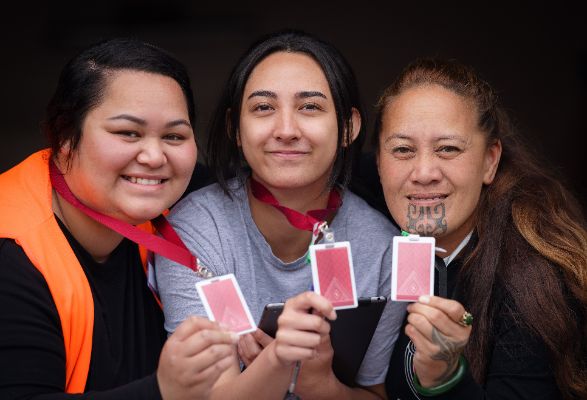Contact Tracing Cards Go Live In Ngongotahā Trial
More than 1100 people will move around the Rotorua suburb of Ngongotahā this week with a new and vital accessory – a COVID contact tracing card.
The cards go “live” on Monday 9 November and are a key part of an on-the-ground trial of the technology and its potential enhancement of the COVID contact tracing process.
Co-designed by Te Arawa COVID Hub, the Ministry of Health and the Universities of Otago and Waikato, the trial’s purpose is to understand how a COVID contact tracing card works in a real-world scenario, whether it is compatible with New Zealand’s contact tracing systems, and if people will accept and use them.
Monty Morrison, from the Te Arawa COVID-19 Response Hub, says the response to the trial has been overwhelming.
“It’s humbling to see so many people in our community recognise how important this trial is and who want to contribute to Aotearoa’s fight against COVID-19.
“We are eager to get the trial underway and recognise that this next stage is a crucial one. We remind whānau to wear the card everywhere they go, so that we can get as many contacts as possible and help ensure the accuracy of the trial,” he says.
A COVID contact tracing card can be worn on a lanyard or clipped to the wearer’s belt. It exchanges signals with anyone nearby who is also wearing a contact tracing card, in what can be described as “a digital handshake”. People involved in the trial should only take the tracing card off when at home.
People who live and/or work in Ngongotahā still have the opportunity to sign up to the trial, with registrations closing at on Monday 9 November.
Trial participants can register online at https://tearawacovid19.nz/card-trial/ and pick up their cards from 172 Ngongotahā Rd (next to the Gull Service Station). Participants will need to wear their cards from Monday 9 November until the end of Sunday 15 November.
So far, the majority of people who have signed up to the trial are women aged between 40 and 74.
A COVID contact tracing card is not capable of tracking the wearer’s location or identity and the information is fully contained, encrypted and protected on each individual card. Its primary function is to build a memory of contacts so the wearer can be quickly alerted if they have been in close contact with someone who has tested positive for COVID-19
Ngongotahā was selected as an ideal location for the trial because it’s big enough to have several marae, a school, shops and communities, and small enough that 1500 people is a significant percentage of the population.



 Gordon Campbell: On Winston Peters’ Battle Against The Phantom Legions Of The Woke
Gordon Campbell: On Winston Peters’ Battle Against The Phantom Legions Of The Woke Greenpeace: Luxon’s Investment Claims Undermined By Breaches Of Free Trade Agreements
Greenpeace: Luxon’s Investment Claims Undermined By Breaches Of Free Trade Agreements Living Wage Aotearoa: Government Cleaners, Security Guards, And Caterers Counting On NZ First
Living Wage Aotearoa: Government Cleaners, Security Guards, And Caterers Counting On NZ First  Environmental Defence Society: Infrastructure Summit Should Prioritise Environmental Outcomes
Environmental Defence Society: Infrastructure Summit Should Prioritise Environmental Outcomes Green Party: Just Six Government MPs Needed To Pass Unlawful Occupation Of Palestine Sanctions Bill
Green Party: Just Six Government MPs Needed To Pass Unlawful Occupation Of Palestine Sanctions Bill Ngāti Manuhiri Settlement Trust: Iwi Welcomes Progress On Northland Expressway
Ngāti Manuhiri Settlement Trust: Iwi Welcomes Progress On Northland Expressway Kick Back: Urgent Review Of MSD Needed To Prevent More Rangatahi Sleeping Rough
Kick Back: Urgent Review Of MSD Needed To Prevent More Rangatahi Sleeping Rough


